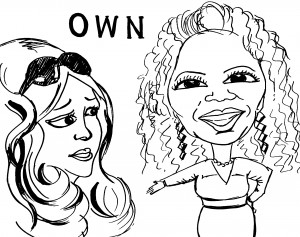Reality shows shouldn’t exploit their subjects
Much of my identity has been shaped by Lindsay Lohan — or shall I say, the more wholesome Lindsay Lohan.
As a small child, I watched The Parent Trap almost every day until my mother, an onlooker with less exposure than I, could even recite the words. Freaky Friday marked my third-grade existence; I wanted to be just like Anna: in a band and resilient against snobby popular girls. I sported a black choker for months to emulate her style. Of course, the form of Lindsay Lohan that is most embedded in the very fabric of my life is her character in Mean Girls. I quote it an annoyingly frequent amount of times a day and hope that maybe someday I’ll embody as much grace as Cady when she won Spring Fling Queen, breaking off pieces of her tiara for everyone in the crowd.
Nowadays, the Lindsay we are all familiar with is the Lindsay that parties an exorbitant amount, the one that checks in and out of rehab and seems to always miss her various court dates. Her escapades in recent years have infiltrated all media outlets and her actions are sometimes bigger news than breaking international events. She has tried to reinvent her image countless times, and as someone who has followed Lindsay for years and even idolized her at one point, it was increasingly disappointing to see her repeated downfalls. Eventually, her news became tiring, and I just resorted to watching Mean Girls for the 100th time.
On March 9, Oprah Winfrey premiered a reality show on her channel, OWN, documenting Lindsay as she picks up the pieces of her life following her very public battles with substance abuse and the law. Clips from Lindsay show the actress saying she “felt like she’s in a prison” with the camera crew constantly surrounding her and Oprah intervening, telling Lindsay to “cut the bull” for missing work. The series is an extension of the Lindsay we have all been accustomed to in the media, yet it also explains her actions. She is perceived as a party girl, but there is a back story to go along with it. Without sounding too maudlin, this series allows the audience to understand her difficult childhood and the pressures of being a child star.
Though I do commend Oprah for using her immense power to inspire change, I question, in this case, if her influence is used in the right way. Utilizing the documentary as a means of casting light on Lindsay’s flaws isn’t the type of programming one would expect from Oprah. People are curious about Lindsay’s life, and their curiosity generates ratings. Lindsay’s life — successes and failures — is used for capital gain. As a person whose life was put under a microscope, which ultimately was one of the factors that her career was put in jeopardy, Lindsay would not benefit from even more cameras in her life. Furthermore, reality television shows should be taken with a grain of salt, because sometimes the production entails for dramatic set-up.
Technicalities aside, Oprah’s new show does lead me to question why viewers, myself included, are interested in Lindsay’s not-so-shining moments at all. Is it because her life is so chaotic that it’s almost a source of entertainment for people to view it seemingly uncensored? Or is it because we want to support her as an underdog? Either way, discriminating against Lindsay’s troubles invites generalities about her life. Making these matters public allows people to focus on the trivial rather than expending their energy on something more useful.
Lindsay Lohan has had a past that is undoubtedly widely covered by the media. It is also a past that people have widely analyzed. Whether she decides to direct her path toward her Disney hey-day is not up to anyone, nor is it anyone’s business.
But if she were to make another film with the same brilliance as Mean Girls, that would be so fetch.
Danni Wang is a freshman majoring in psychology. Her column, “Pop Fiction,” runs Tuesdays.


